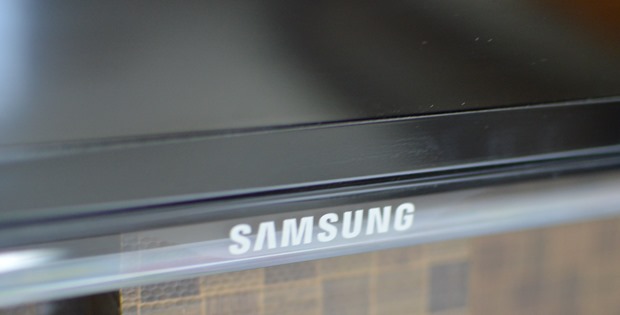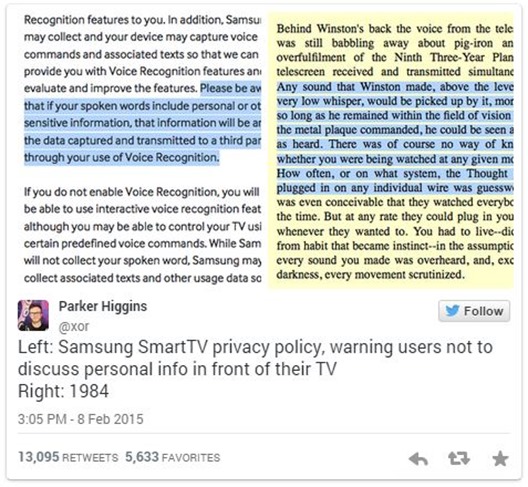Have Smart TV At Home? Be Careful, It May Record & Relay Private Data To 3rd Party!

As kids, most of us would be intrigued when parents nudged each other and then headed to the adjoining room for a private conversation- so that kids could not overhear the whole thing and then spill the beans at the most unexpected and awkward moments later on.
Didn’t we hate them for that?
Imagine you having to do the same- going to the other room. So that you TELEVISION cannot overhear you talking!
Those using voice recognition feature on Samsung’s internet connected SmartTV will now have to do the same, or else their conversations in front of the television could be recorded by the hideous device hanging up the wall and then transmitted to third parties.
So if you have been avoiding the half a mile long Privacy Policy accompanying any gadget till now, it is time to start reading the same more carefully. That because Samsung mentions it in no so many words within their policy. Only the TV buyers haven’t been careful enough to read the whole thing.
It is not unusual for makers of Smart TVs to ask users’ consent for having their viewing data sent back but in this particular case, the device maker is warning users to exercise self-restraint in the presence of the device, or else their conversation might be recorded and then shared with third parties.
The weird feature of the TV and the manner in which these devices could go on to collect more information, than users might want to pass on, came into limelight when Electronic Frontier Foundation activist Parker Higgins tweeted a picture of the privacy policy next to an excerpt from George Orwell’s 1984.

And every time you read the policy, the funnier it seems to you.
For example, it reads, “If you do not enable Voice Recognition, you will not be able to use interactive voice recognition features, although you may be able to control your TV using certain predefined voice commands. While Samsung will not collect your spoken word, Samsung may still collect associated texts and other usage data so that we can evaluate the performance of the feature and improve it.
“You may disable Voice Recognition data collection at any time by visiting the ‘settings’ menu. However, this may prevent you from using all of the Voice Recognition features.”
This might have passed on as the usual jargon associated with almost all privacy policies till this sentence caught the eye of a watchful reader, “Please be aware that if your spoken words include personal or other sensitive information, that information will be among the data captured and transmitted to a third party.”
Now, WHO, if I may ask, would be the ‘third party’ interested in knowing what we are talking about at home?
And why would a third party be allowed to have access to all that is being discussed within the four walls of my house except for allowing them to market their products to me in a ‘better’ manner in future?
With the Internet of Things, most of our devices are connected (or will soon be) to each other. As the voice recognition is becoming a standard feature for most of these connected devices, it looks like all gadgets in the home will turn into spying devices!
I am beginning to dread the prospect- imagine having to put your cell phone, your smart watch, your iPad, fitness tracker, etc all away if you want to keep a conversation personal!
Though the company is now telling them that they will know when their device is recording the conversation. They will see a microphone icon appearing on the screen when it begins to record, it is being told.
Now again- why should I become a slave to my TV (and an expensive one at that) just because I installed one and have to check the screen time and again, just to make sure that some ‘third party’ does not overhear me?
After getting a lot of flak from all quarters, the company later said while talking to The Daily Beast, “Samsung takes consumer privacy very seriously. In all of our Smart TVs we employ industry-standard security safeguards and practices, including data encryption, to secure consumers’ personal information and prevent unauthorized collection or use.”
“Voice recognition, which allows the user to control the TV using voice commands, is a Samsung Smart TV feature, which can be activated or deactivated by the user. The TV owner can also disconnect the TV from the Wi-Fi network.”
While I am still not very pleased about this feature or installing this eavesdropping gadget anywhere in my home, it is time customers started reading the privacy policy accompanying their smart devices more carefully.
If you’re thinking of buying a SmartTV, roll up your sleeves and get ready to outsmart it first!

looks like d future will b all about intrusion, intrusion and intrusion only! I really don’t understand whether to call it a “smart TV” or a “spy”?
It shouldn’t be called smart TV. It should be called “over-smart” TV.